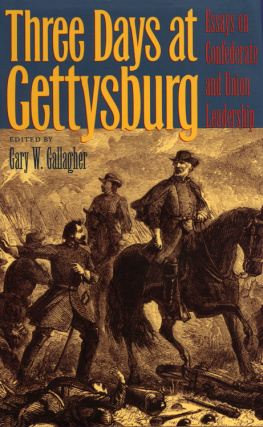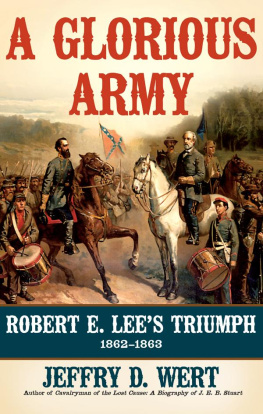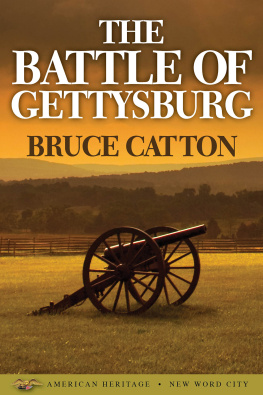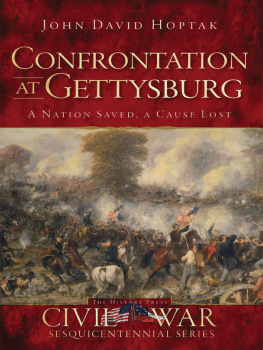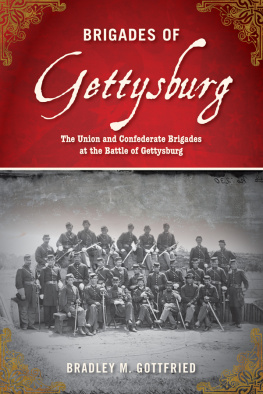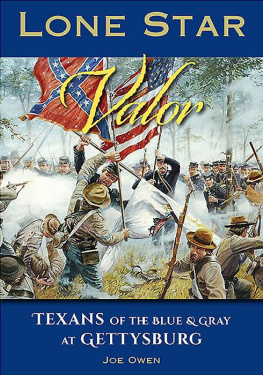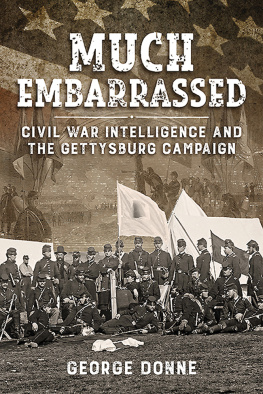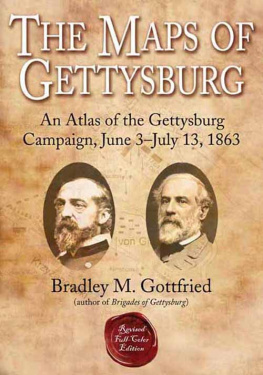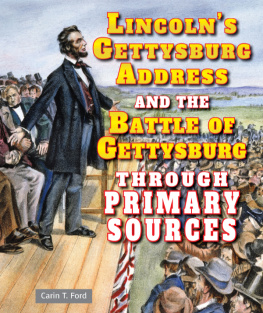EDITED BY GARY W. GALLAGHER
p. cm.
Includes bibliographical references and index.
ISBN 0-87338-629-9 (cloth : alk. paper)
1. Gettysburg (Pa.), Battle of, 1863. 2. Command of troopsCase
studies. I. Gallagher, Gary W. II. The first day at Gettysburg.
III. The second day at Gettysburg. IV. Title: 3 days at Gettysburg.
British Library Cataloging-in-Publication data are available.
Contents
Gary W. Gallagher
Confederate Corps Leadership on the First Day at Gettysburg:
A. P. Hill and Richard S. Ewell in a Difficult Debut
From Chancellorsville to Cemetery Hill:
O. O. Howard and Eleventh Corps Leadership
Three Confederate Disasters on Oak Ridge:
Failures of Brigade Leadership on the First Day at Gettysburg
If the Enemy Is There, We Must Attack Him:
R. E. Lee and the Second Day at Gettysburg
The Peach Orchard Revisited:
Daniel E. Sickles and the Third Corps on July 2, 1863
If Longstreet Says So, It Is Most Likely Not True:
James Longstreet and the Second Day at Gettysburg
A Step All-Important and Essential to Victory:
Henry W. Slocum and the Twelfth Corps on July 12, 1863
No Troops on the Field Had Done Better:
John C. Caldwells Division in the Wheatfield, July 2, 1863
Rarely Has More Skill, Vigor, or Wisdom Been Shown:
George G. Meade on July 3 at Gettysburg
Every Map of the Field Cries Out about It:
The Failure of Confederate Artillery at Picketts Charge
I Do Not Believe That Picketts Division Would Have Reached
Our Line: Henry J. Hunt and the Union Artillery on July 3, 1863
THIS BOOK BRINGS TO COMPLETION A PROJECT BEGUN in 1992. The First Day at Gettysburg: Essays on Confederate and Union Leadership appeared that year, followed in 1993 by The Second Day at Gettysburg: Essays on Confederate and Union Leadership. A third volume covering July 3, 1863, which was to have been published soon after the second book, languished because of my tendency to take on too many commitments. After the passage of several years and reflection about how best to present material on the battles third day following so long a hiatus, I proposed offering in a single volume the nine original essays together with four new ones devoted to leadership on July 3. John T. Hubbell at The Kent State University Press, exhibiting admirable patience regarding this project, agreed that a single book covering the entire battle made sense. The result is Three Days at Gettysburg: Essays on Confederate and Union Leadership.
No Civil War military campaign has inspired as much controversy relating to leadership as Gettysburg. The debates began almost immediately after the battle, and they continue today. After the war, Confederates engaged in fierce arguments over who was to blame for their defeat. Following the lead of Lost Cause writers who sought to absolve Lee of all responsibility (Lee himself had taken full responsibility during the war), most white Southerners fixed on James Longstreet as their principal villain. For his part, Longstreet suggested that Lees actions invited critical scrutiny. Less vitriolic discussion focused on the actions of Richard S. Ewell and A. P. Hill, Lees other two corps commanders, as well as on cavalry chief James E. B. Stuart, division leader Jubal A. Early, and various others. On the Union side, supporters of the Army of the Potomacs commander George G. Meade and Third Corps chief Daniel E. Sickles waged a bitter battle of words about events on July 2. Northern veterans also wrangled about who should receive credit for establishing the splendid defensive position on high ground south of Gettysburg on July 1. In one way or another, corps commanders Oliver Otis Howard, Winfield Scott Hancock, and Henry W. Slocum, as well as the brilliant artillerist Henry J. Hunt, figured in postwar bickering about what had transpired on July 13, 1863.
Many of the principals defended their actions at Gettysburg in memoirs, reminiscences, articles, essays, and published speeches. Some of the leading outlets for Gettysburg-related material included Century Magazines Battles and Leaders series, the Philadelphia Weekly Timess similar Annals of the War, and the Southern Historical Societys Papers. By the end of the nineteenth century the literature on Gettysburg already was extensive, and throughout the twentieth century historians have labored to increase its imposing mass. In 1982, Richard A. Sauerss The Gettysburg Campaign, June 3August 1, 1863: A Comprehensive, Selectively Annotated Bibliography listed more than 2,750 items, and the decade and a half since that book appeared has witnessed an explosion of new scholarship. Much of this recent work has dealt, at least in part, with Confederate and Union leadership on the battlefield.
Although the size of the existing literature has prompted many historians to wonder whether military leadership at Gettysburg has been exhausted as a topic for fruitful study, the contributors to this volume believe that there is room for scholarship of at least two types. The first entails revisiting the sources on which earlier accounts have been based, submitting them to rigorous evaluation and testing widely accepted interpretations of key officers performances. The second approach involves training the investigative lens on relatively neglected officerssome at the corps level and some of lower rankwith an eye toward illuminating not only what happened at Gettysburg but also the nature of command at different levels. Because Gettysburg was a defining moment for both the Army of the Potomac and the Army of Northern Virginia (neither organization was ever quite the same afterward), the contributors believe that commanders and their decisions that influenced the course of the battleand by extension the later histories of the armiesretain validity as subjects of scholarly exploration.
The book is divided into three parts, opening with four essays on leadership during the first days battle. Alan T. Nolan leads off with an evaluation of Lees strategy and tactics, finding the Confederate chieftain wanting in both areas. The movement across the Potomac invited unnecessary risk for the Army of Northern Virginia, insists Nolan, and Lees decision to press the tactical offensive shortly after he arrived on the battlefield needlessly diminished his limited pool of precious manpower. Fighting on July 1 provided the first major test for the Confederate armys three-corps structure instituted following the death of Stonewall Jackson; it also marked the debut in corps command of Richard S. Ewell and A. P. Hill, who suffer invidious comparisons with Jackson in much of the literature on Gettysburg. In the second essay I suggest that Lee more than anyone else controlled Confederate tactical decisions on July 1 and that he, rather than either of his new corps commanders, should be the focus of analysis for those who choose to criticize the handling of the Southern army on that fateful day.

